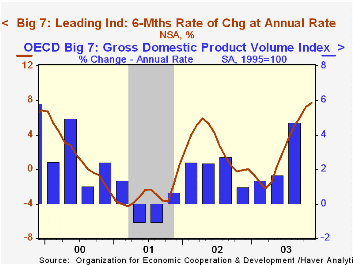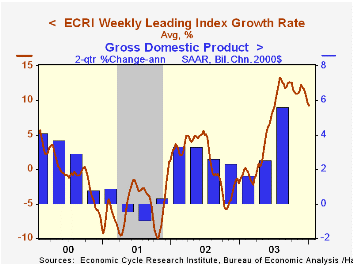 Global| Jan 12 2004
Global| Jan 12 2004OECD Leaders Signal Further Growth
by:Tom Moeller
|in:Economy in Brief
Summary
The Index of Leading Indicators for the Major Seven OECD Countries rose 0.7% (5.3% y/y) in November, the eighth consecutive firm monthly gain. Revisions to the leading indexes for Japan and in North America substantially lowered [...]

The Index of Leading Indicators for the Major Seven OECD Countries rose 0.7% (5.3% y/y) in November, the eighth consecutive firm monthly gain. Revisions to the leading indexes for Japan and in North America substantially lowered growth in 2001 and 2002.
Six-month growth in the leading index rose to 7.7%, the strongest in nearly ten years.
Gains amongst the member country leading indexes again were broad and strong. The leading index for the European Union rose 0.5% (4.5% y/y), the strongest y/y growth since 2003.
In France, the leading index jumped 0.9% (3.8% y/y) as the yield curve steepened, factory sector prospects brightened and the future tendency of production rose. The leaders in Germany also jumped 1.1% (6.8% y/y) as a firmer orders inflow led to an improved business climate. In Italy the leaders fell for the second consecutive month (+2.2% y/y).
In Canada the leading index fell slightly in November (3.2% y/y) and in the U.K. the leaders were unchanged (+0.7% y/y), soft for the third consecutive month despite firmer prospects for production. Leading indicators in the United States jumped 1.4% (8.2% y/y).
Leaders in Japan fell 0.2% (1.9% y/y) as share prices eased.
Visit the OECD's website at this website.
| OECD Main Economic Indicators | Nov | Oct | Y/Y | 2002 | 2001 | 2000 |
|---|---|---|---|---|---|---|
| OECD Major Seven - Leading Index (Trend Restored) | 120.9 | 120.1 | 5.3% | 2.4% | -3.0% | 2.9% |
| European Union | 122.2 | 121.6 | 4.5% | 3.3% | -1.6% | 3.8% |
| Japan | 101.5 | 101.8 | 1.9% | -0.5% | -4.4% | 1.5% |
| United States | 132.4 | 130.5 | 8.2% | 2.9% | -3.4% | 2.7% |
by Tom Moeller January 12, 2004

The Weekly Leading Index of the US economy published by the Economic Cycle Research Institute (ECRI) was flat in the opening week of 2004.
The six-month growth rate of the weekly leading index also eased to 9.2%, the weakest growth rate in about six months. Slightly higher jobless claims and falling prices of basic materials offset strong stock market gains in the latest week.
During the last ten years there has been a 65% correlation between the six-month growth in the leading index and the two quarter growth in real GDP.
Construction of the ECRI Leading Index differs from the Index of Leading Economic Indicators published by the Conference Board. Nevertheless there has been a 75% correlation between the y/y percent change in the two series over the last 20 years.
The components of the ECRI weekly leading index are money supply plus stock & bond mutual funds, the JOC-ECRI industrial materials price index, mortgage applications, bond quality spreads, stock prices, bond yields, and initial jobless insurance claims.
The median lead of the ECRI index at business cycle peaks has been 10.5 months and at cycle troughs 3.0 months. The sideways movement of the leading index in 2002 may or may not signal something about the economy's growth rate.
For more on ECRI and the Weekly Leading Index go to this link.
| ECRI Leading Index | 01/02/04 | 12/26/03 | Growth Rate | 2003 | 2002 | 2001 |
|---|---|---|---|---|---|---|
| Weekly | 129.7 | 129.7 | 9.2% | 6.6% | 1.1% | -5.3% |
| Dec | Nov | |||||
| Monthly | 130.3 | 130.7 | 10.8% |
Tom Moeller
AuthorMore in Author Profile »Prior to joining Haver Analytics in 2000, Mr. Moeller worked as the Economist at Chancellor Capital Management from 1985 to 1999. There, he developed comprehensive economic forecasts and interpreted economic data for equity and fixed income portfolio managers. Also at Chancellor, Mr. Moeller worked as an equity analyst and was responsible for researching and rating companies in the economically sensitive automobile and housing industries for investment in Chancellor’s equity portfolio. Prior to joining Chancellor, Mr. Moeller was an Economist at Citibank from 1979 to 1984. He also analyzed pricing behavior in the metals industry for the Council on Wage and Price Stability in Washington, D.C. In 1999, Mr. Moeller received the award for most accurate forecast from the Forecasters' Club of New York. From 1990 to 1992 he was President of the New York Association for Business Economists. Mr. Moeller earned an M.B.A. in Finance from Fordham University, where he graduated in 1987. He holds a Bachelor of Arts in Economics from George Washington University.
More Economy in Brief
 Global| Feb 05 2026
Global| Feb 05 2026Charts of the Week: Balanced Policy, Resilient Data and AI Narratives
by:Andrew Cates






